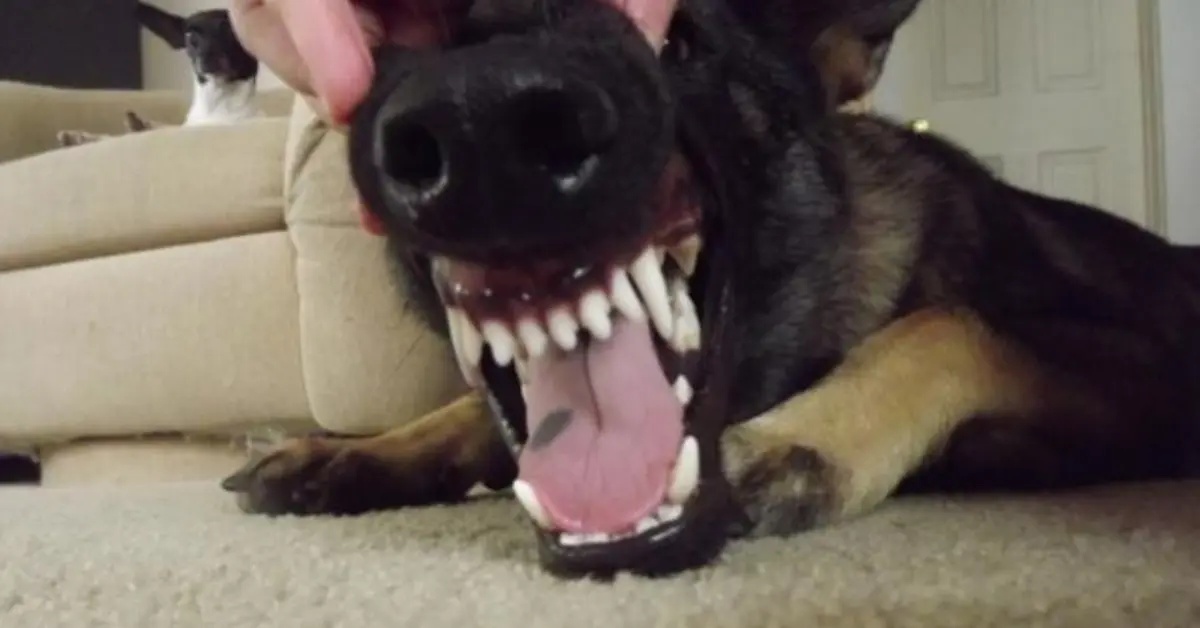As responsible owners, understanding the teething stages, ages, and timeline of baby teeth in German Shepherds is crucial to ensuring their optimal dental health and overall well-being. The proper care of teeth during these stages is compulsory. In This Article, we will explore the different teething stages in GSD puppies and how to care for the teeth
The Teething Journey: German Shepherd Puppy Teeth Chart
Just like human babies, German Shepherd puppies go through a series of teething stages as they grow. The journey begins around three to four weeks of age when the puppy’s baby teeth, also known as deciduous teeth, start to emerge. This process typically lasts until they are around six to seven months old, with the following key stages:
1. 3-4 Weeks: The incisors, the small teeth at the front of the mouth, are the first to appear. These are essential for grooming and holding objects.
2. 4-5 Weeks: The canines, which are the more pointed teeth, begin to emerge. These teeth aid in gripping and tearing food.
3. 5-6 Weeks: The premolars, flat-topped teeth used for grinding, start coming in. These play a crucial role in chewing and breaking down food.
4. 6-7 Weeks: The molars, located at the back of the mouth, complete the set of baby teeth. These teeth further assist in grinding food particles.
German Shepherd Teething Age: What to Expect
The teething age for German Shepherds marks a significant developmental phase in their early life. Just like human infants, German Shepherd puppies go through a natural process of shedding their baby teeth and growing in their adult teeth. Understanding what to expect during this teething period can help you provide the necessary care and support for your furry friend.
When Does Teething Begin?
German Shepherd puppies start getting their first teeth when they are about three to four weeks old. The first teeth to come in are called deciduous teeth, and they are the small teeth at the front of the mouth, known as incisors. Usually, puppies don’t feel any pain during this early stage of teething, and you might not see these changes unless you look very closely.
The Discomfort Phase
As your German Shepherd puppy approaches the age of four months, you’ll likely notice a more active teething phase. This is when discomfort can become evident. The puppy’s gums may appear red or slightly swollen, and they might experience mild pain or irritation. This discomfort leads to a natural instinct to chew and bite in an attempt to alleviate the soreness.
During this phase, your German Shepherd may seek out objects to chew on, whether it’s their toys, household items, or even your fingers. It’s essential to provide appropriate chew toys and items to help soothe their gums. Chewing not only eases their discomfort but also aids in the natural process of shedding baby teeth to make way for permanent ones.
Signs to Watch For
When your German Shepherd puppy is growing new teeth, you might notice a few things:
Chewing More: Puppies chew a lot when they’re teething. Give them safe toys to chew on so they don’t chew things they shouldn’t.
Drooling: New teeth can make a puppy drool more. Clean their mouth area often to keep them comfortable and to prevent skin problems.
Eating Less: Sometimes puppies don’t feel like eating as much when they’re teething. If your puppy isn’t eating well, it’s a good idea to talk to the vet.
Feeling Grumpy: Getting new teeth can make puppies a bit grumpy or restless. Try to be extra kind and help them feel better during this time.
Caring for a Teething German Shepherd
To provide the best care for your teething German Shepherd, consider these tips:
Chew Toys: Offer a variety of safe and durable chew toys specifically designed for teething puppies. These toys can help relieve discomfort and keep your puppy entertained.
Cold Compresses: Chilled, damp washcloths or specially designed teething toys that can be cooled in the refrigerator offer relief to sore gums.
Gentle Massaging: Gently massage your puppy’s gums with your clean finger. This can help alleviate some of the discomfort.
Regular Veterinary Check-ups: Keep up with your puppy’s routine veterinary appointments. Your veterinarian can monitor the teething process and provide guidance if any issues arise.
When Do German Shepherds Stop Teething?
The teething process in German Shepherds usually concludes around six to seven months of age. By this time, the deciduous teeth should have fallen out, making way for the adult teeth to take their place. The adult teeth, also known as permanent teeth, are stronger and better suited for a German Shepherd’s lifelong activities and diet.
How to Stop My German Shepherd Puppy from Biting

Biting is a common behavior in German Shepherd puppies, especially during their teething phase. While it’s a natural instinct for them to explore the world through their mouths, it’s important to teach them appropriate biting behavior to ensure a harmonious relationship between you and your furry friend. Here are effective strategies to curb biting and encourage proper behavior:
1. Provide Appropriate Chew Toys
German Shepherd puppies have a strong urge to chew, especially when their gums are sore during teething. Offer a variety of sturdy and safe chew toys that are designed to soothe their gums. These toys not only provide relief but also redirect their biting tendencies away from your hands and belongings. Choose toys that are the right size for your puppy and rotate them to keep their interest.
2. Use Positive Reinforcement
Positive reinforcement is a powerful tool in shaping your puppy’s behavior. Whenever your German Shepherd puppy displays good behavior, such as playing with their toys instead of biting, offer praise, treats, or affection. This reinforces the idea that appropriate play is rewarded, making them more likely to repeat the behavior.
3. Engage in Obedience Training
Enrolling your puppy in obedience training classes is an excellent way to establish clear boundaries and teach them basic commands. Commands like “sit,” “stay,” and “leave it” can be particularly helpful in redirecting their attention and discouraging unwanted biting. Obedience training also strengthens the bond between you and your puppy and helps them understand your expectations.
4. Socialization Matters
Proper socialization plays a crucial role in shaping your puppy’s behavior. Expose your German Shepherd to various people, places, and situations from a young age. This exposure helps them develop confidence and reduces the likelihood of fearful or aggressive behavior, which can sometimes manifest as excessive biting.
5. Redirect and Distract
When your puppy does attempt to bite, calmly redirect their attention to an appropriate chew toy or engage them in a game. This not only prevents them from biting but also teaches them to associate playtime with toys rather than your hands.
6. Time-Outs
If your puppy’s biting becomes persistent or overly aggressive, a short time-out can be an effective technique. Withdraw your attention and temporarily remove yourself from their presence. This teaches them that biting leads to a cessation of play and interaction, helping them understand that gentle play is more rewarding.
7. Be Patient and Consistent
Breaking the habit of biting takes time and consistency. Stay patient and avoid any form of punishment or harsh physical corrections, as this can lead to fear and mistrust. Instead, focus on positive reinforcement and redirecting their behavior towards appropriate outlets.
8. Seek Professional Guidance
If your German Shepherd puppy’s biting behavior persists or escalates despite your efforts, consider seeking guidance from a professional dog trainer or behaviorist. They can provide tailored advice and techniques based on your puppy’s specific needs and temperament.
German Shepherd Teeth Problems: Solutions and Care
While German Shepherds are generally healthy dogs, they can experience dental issues, including gum disease, tooth decay, and misalignment. To prevent and address these problems:
1. Regular Dental Care: Brush your dog’s teeth regularly with a dog-friendly toothpaste and toothbrush. This helps prevent plaque buildup and promotes healthy gums.
2. Balanced Diet: Feed your German Shepherd a balanced diet that supports their dental health. Consult your veterinarian for specific dietary recommendations.
3. Chew Toys and Dental Treats: Offer dental-specific toys and treats designed to reduce plaque and tartar buildup while providing entertainment.
4. Routine Veterinary Check-ups: Regular visits to the vet include dental examinations, ensuring any potential issues are detected early.
Conclusion
Understanding the teething stages, age, and timeline of baby teeth in German Shepherds is essential for every responsible owner. Proper care during this developmental phase sets the foundation for a lifetime of good oral health and overall well-being. By providing appropriate chew toys, positive reinforcement, and regular dental care, you can ensure that your German Shepherd’s teeth remain strong and healthy throughout their life.
FAQs
When do German Shepherds start teething?
Teething usually begins around three to four weeks of age when the incisors start to emerge.
How can I stop my German Shepherd puppy from biting?
Provide chew toys, use positive reinforcement, engage in training and socialization, and redirect their attention when biting occurs.
What are some common dental problems in German Shepherds?
Common dental issues include gum disease, tooth decay, and misalignment. Regular dental care and veterinary check-ups can help prevent and address these problems.

